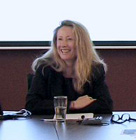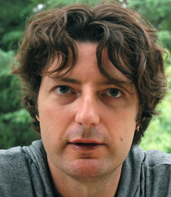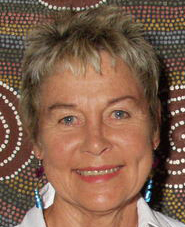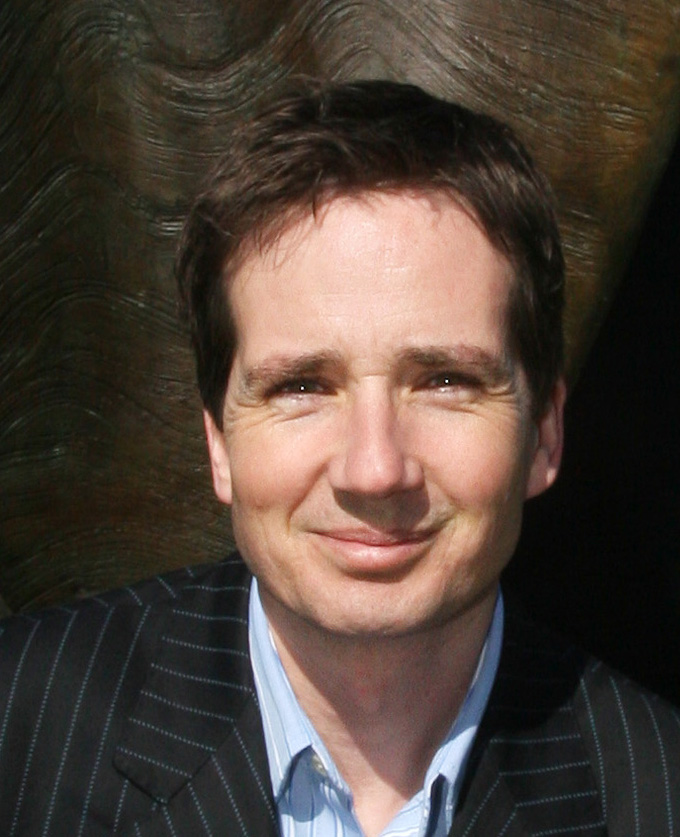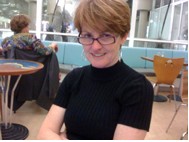Australian Research Council Linkage Project
Partner institutions:
Australian Museum
Museum Victoria
Questacon
Powerhouse Museum
Liberty Science Center (USA)
Hot Science Global Citizens Research Team
|
|
Dr Fiona Cameron [Lead Chief Investigator] is a Senior Research Fellow at the Centre for Cultural Research, University of Western Sydney. Fiona is a leading scholar in the field of museum studies internationally. Her research and writing focuses on the idea of the museum and interrelationships between institutions and contemporary societies in an increasingly complex and globalising world, with projects in two areas of interest. The first examines the agency of the museum sector in |
|
public culture in the representation of 'hot' topics of societal significance and importance. The second investigates digital technologies and museum collections. She has been a recipient and lead Chief Investigator of four ARC Linkage grants, the most recent being the international research project, Hot Science, Global Citizens: The Agency of the Museum Sector in Climate Change Interventions, with the Australian Museum, Museum Victoria, Questacon (Canberra), Powerhouse Museum (Sydney) and the Liberty Science Center (New York). Other notable projects and international collaborations include the ARC SPIRT project, Exhibitions as Contested Sites - The Roles of Museums in Contemporary Societies with the Australian Museum and the Australian War Memorial and 28 other institutions, also funded by the Canadian Museums Association, and the ARC Linkage project, Reconceptualising Heritage Collections with the Powerhouse Museum, Sydney. Fiona is frequently called on as a keynote and plenary speaker at international conferences. She also regularly conducts research with partners in the United States, Canada and the UK. Publications include five book chapters, numerous articles in refereed journals, and two co-edited collections, Theorizing Digital Cultural Heritage: A Critical Discourse (MIT Press, 2007) with Associate Professor Sarah Kenderdine and Hot Topics, Public Culture, Museums (Cambridge Scholars, 2010) with Dr Lynda Kelly and a monograph, Liquid governmentalities and the climate crisis (forthcoming). Dr Cameron is also a museum practitioner and has worked in the sector as a museum director, a social history curator and as a curatorial consultant on major exhibition projects in New Zealand, Australia, Singapore and Vanuatu. See full Profile and contact details.
|
|
|
|
Professor Bob Hodge [Chief Investigator 2] is a founding member of the Centre for Cultural Research, University of Western Sydney. Professor Hodge has many active research interests: in analytic and conceptual toolkits for social and cultural research (critical linguistics, discourse analysis, social semiotics); in major theoretical traditions in humanities and social sciences (Marxism, psychoanalysis, post-colonialism, post-modernism, critical management studies, chaos theory); in radical transdisciplinarity (including science in the mix) and engaged research; and in specific areas of study (globalisation, cyberculture, Australian Studies, Indigenous Studies, Mexico and |
|
Latin America, Chinese language and culture, education, popular culture, literature (classical, early modern, contemporary). He has published in all these areas, and has supervised doctoral studies on all of them and more. See full Profile and Contact Details.
|
|
|
|
Associate Professor Brett Neilson [Chief Investigator 3] is Director of the Centre for Cultural Research at UWS. His research and writing aims to provide alternative ways of conceiving globalisation, with particular emphasis upon its cultural dimensions. Drawing on cutting edge cultural and social theory as well as on empirical and archival information, this research has derived original and provocative means for rethinking the significance of globalisation for a wide range of contemporary |
|
problems and predicaments, including the circulation of popular culture, the burgeoning of social movements, the ascendancy of global financial markets, the evolving concern for security, and the pressures of population ageing. Associate Professor Neilson also maintains a secondary line of research that applies the insights of global cultural studies to the interpretation of literary and visual texts. His writings have been translated into eight languages: Italian, French, German, Swedish, Finnish, Chinese, Japanese and Korean. See full Profile and Contact Details.
|
|
|
|
Dr. Juan Francisco Salazar [Chief Investigator 4] is a Senior Lecturer in Communication and Media Studies at the School of Communication Arts and a researcher at the Centre for Cultural Research, University of Western Sydney. Dr Salazar's research interests and areas of expertise include: media anthropology; community and alternative media; Indigenous media and communication rights; communication and social change, ICT's in education and intercultural dialogue; cultural imaginations of |
|
Antarctica; Latin American cultural studies. He lectures on screen media arts, and in theories and practices of convergent media, including experimental arts and documentary video. He has collaborated with a wide range of community media/arts organizations and artists including several local councils in Western Sydney and activist groups, and Indigenous organizations in Chile and Mexico. He has being involved and coordinated several consultancy projects and evaluations, for a range of organizations including UNESCO and Chilean government agencies and non-for-profit foundations. He is an international coordinator of the OURMedia Network since 2004 and is associated to the Latin American Council of Indigenous Film and Communication (CLACPI). See full Profile and Contact Details.
|
|
|
|
Emeritus Professor Jann Conroy [Chief Investigator 5] is a member of the Centre for Plants and the Environment at UWS. Her research has focused on understanding how climate change will influence the trade-off between growth and water use of fast and slow-growing eucalypts. The novel feature of this research is that the trees are exposed to CO2 concentrations of 280ppm (pre-industrial level), 400ppm (current) and 700ppm (predicted for the future) in combination with higher temperatures and |
|
periodic drought. The research was conducted in the facilities of the Hawkesbury Forest Experiment (controlled-environment glasshouses and CO2-enrichment field site).
|
|
|
|
Professor David Karoly [Chief Investigator 6] is Professor of Meteorology and an ARC Federation Fellow in the School of Earth Sciences at the University of Melbourne. He is an expert in climate change science and was involved, through several different roles, in the preparation of the Fourth Assessment Report of the Intergovernmental Panel on Climate Change (IPCC) released in 2007. The IPCC was awarded the Nobel Peace Prize in 2007, jointly with Al Gore, "for their efforts to build up and disseminate greater knowledge about man-made climate change, |
|
and to lay the foundations for the measures that are needed to counteract such change". Professor Karoly is active in research on climate variability and climate change, including greenhouse climate change, stratospheric ozone depletion and interannual climate variations due to El Niño-Southern Oscillation. Recently, he has been studying the impacts of climate change on weather extremes and their impacts on human and natural systems. He was Chair of the Premier of Victoria's Climate Change Reference Group during 2008-09 and was invited to join the Australian Government's High Level Coordinating Group on Climate Change Science at the end of 2009. He is also a member of the Wentworth Group of Concerned Scientists and the Australian Academy of Sciences' National Committee on Earth System Science. Professor Karoly joined the School of Earth Sciences at the University of Melbourne in May 2007 after receiving a Federation Fellowship from the Australian Research Council. From 2003 to 2007, he was the Williams Chair Professor of Meteorology in the School of Meteorology at the University of Oklahoma. During 2001-2002, he was Professor of Meteorology and Head of the School of Mathematical Sciences at Monash University in Melbourne. From August 1995, he was Director of the Cooperative Research Centre for Southern Hemisphere Meteorology at Monash University until it closed in June 2000. In 1993, Professor Karoly received the Meisinger Award from the American Meteorological Society. In 1998, he received the Norbert Gerbier-Mumm International Award from the World Meteorological Organization for a joint research paper with ten international collaborators. In 1999, he was elected a Fellow of the American Meteorological Society for outstanding contributions to the atmospheric sciences over a substantial period of years.
|
|
|
|
Dr Ben Dibley is currently working as a research officer at the Centre of Cultural Research, University of Western Sydney, on an ARC Linkage project, Hot Science, Global Citizens: The Agency of the Museum Sector in Climate Change Interventions. He was awarded a Doctor of Philosophy from the Australian National University with a thesis entitled, Expositions: Theory, Culture, Museum. Dibley has recent or forthcoming publications |
|
in the International Journal of Cultural Studies, Cultural Studies Review and New Formations. He has also co-edited a special issue of New Zealand Sociology on the Antipodes and museums. Dibley’s research interests have two strands, one focuses on questions of colonialism and museums; the other, on the implications of the Anthropocene for humanities and social science scholarship.
|
|
|
|
Dr Anne Newstead is currently a research officer on the ARC Linkage project, Hot Science, Global Citizens: The Agency of the Museum Sector in Climate Change Interventions, and a Visiting Fellow at the University of New South Wales.She earned a doctorate (D.Phil.) from the University of Oxford in 2004 on the topic of agent’s knowledge, and also holds a B.Phil. in Philosophy from Oxford and a BA cum laude from Yale University. |
| Since emigrating to Australia from the UK, she has worked as a Research Associate on the ARC Discovery Project, ‘Mathematics: the Science of Structure’ (2007-2010) and on occasion as a casual lecturer in Philosophy at the University of New South Wales and the University of Sydney. Her research interests include philosophy of science (especially mathematics), epistemology, theories of agency, and the history of analytic philosophy. | |
Partner Investigators
|
|
|
|
Professor Graham Durant has worked in high level managerial roles for various museums and science centres over the past 28 years, most recently as the Director of Questacon – The National Science and Technology Centre in Canberra, Australia. Since taking over the position of Director, Graham has ushered in a new era of political awareness of the centre at a time when Questacon is achieving record numbers and programs are expanding in scope and reach. Graham’s latest endeavour is incorporating |
|
International Polar Year activities within Questacon’s programmes, as well as spearheading initiatives within the Asia Pacific (ASPAC) region. Graham is currently the convenor for Project IGLO, an International action on Global Warming, for the ASPAC region. In particular, Graham has been instrumental in organising discussions on the role of science centres in contributing to the knowledge and understanding of the community about global warming and climate change. He is taking an active role in the development of initiatives and best practice to ensure that science centres and museums are at the forefront of information dissemination and education for all age groups on important and controversial issues.
|
|
|
|
Professor Richard Sandell is the Head of Museum Studies at the University of Leicester and has particular interests in the social role and agency of cultural organisations and, in particular, the museum's potential to combat prejudice and inequality. He teaches on a range of Masters programmes in the areas of museum management and marketing, the social role of museums and audience development while also supervising research for PhD students in subjects related to museum audiences, |
|
management and marketing, and social inclusion. Sandell was a fellow at the Smithsonian Institution during part of 2003-2005, pursuing research into the role that museums play in combating prejudice. In April 2008 he took up a Visiting Fellowship at the Humanities Research Centre, Australian National University, to pursue his research project, ‘Museums, Moralities and Human Rights’. In 2004 Sandell was invited to be an advisor to the American Association of Museums’ taskforce on Museums and Diversity. He was also invited to present findings of recent research to a Department for Cultural, Media and Sport (DCMS) seminar as part of the consultation on the policy ‘Understanding the Future: Priorities for England’s museums’, January 23 2007. Sandell is a frequent keynote speaker at international conferences, reflective of his innovations and authority in the field of museum equity, diversity and inclusion.
|
|
|
|
Dr Lynda Kelly is Head of Audience Research at the Australian Museum, Sydney and a Partner Investigator in the project. She has published widely in museum evaluation and writes the Audience Research Blog with a readership of around 1,500 per month. She is particularly interested in visitor experiences and learning and how these can be measured, young children's |
|
learning, Indigenous evaluation, as well as the strategic uses of audience research and new technologies in organisational change. She is happily obsessed with all things Web 2.0 and curious to see how this will change the world that museums operate within and the ways people learn. Lynda also administesr Museum 3.0, a social network site for museum professionals, with an active, global membership of over 2,000. In 2007 she completed her PhD in museum learning, and now that's finished she is looking forward to the adventures the new web world will bring. In 2010 her latest book, Hot Topics, Public Culture, Museums, co-edited with Dr Fiona Cameron, University of Western Sydney, will be released. Dr. Kelly has been Partner Investigator (PI) on five major collaborative Australian Research Council projects: Exhibitions as contested sites: the role of museums in contemporary society (2000-2004, University of Sydney); Increasing visitor frequency (2004-2007, University of Technology, Sydney); New Literacies, New Audiences (2005-2008, Queensland University of Technology); Engaging With Social Media in Museums (2008-2010, Swinburne University of Technology); Hot Science Global Citizens (2008-2011, University of Western Sydney). Her other research projects include Museums Actively Researching Visitor Experiences and Learning a University of Technology Industry Seeding Grant (2001) Measuring the Impact of Museums on their Local Communities a University of Technology Industry Seeding Grant (2003) and Identity based personalised mobile content with University of Sydney/Smart Services CRC (2009-2011).
|
|
|
|
Wayne LaBar is Vice President of Exhibitions and Theaters for the Liberty Science Center, NJ (USA). With 20 years of museum exhibition development/design experience, Wayne LaBar became Vice President of Exhibitions and Theaters for the Liberty Science Center in 1999. Liberty Science Center, in Jersey City, NJ is located directly across from lower Manhattan. Exploring how to use exhibits and science centers as a medium to engage the public in science and technological issues as well as exploring new roles that emerging technologies can take has been a focus for LaBar |
|
since taking on a leadership role in the field. This project began in his capacity as Director of Exhibits/Exhibit Implementation at the Tech Museum of Innovation in San Jose, Ca. This was a new facility built to look at and explore the new technologies being developed in what is known as Silicon Valley. Wayne also heads an ambitious push to explore how new technology can encourage guests to interact with exhibitions. Examples are “Science Now Science Everywhere” or “SNSE” (www.snse.lsc.org), a unique cell phone application and the Exhibit Commons (http://www.lsc.org/interactive/exhibit-commons), an “open source” exhibit initiative that invites guests to contribute to the museum’s mutable exhibitions, presenting new information or divergent points of view, building on the phenomena of social software. Through these efforts and others, Wayne and his fellow team members are currently exploring how to use new advances in technology and their resultant social changes to advance the exhibition field. Their latest project is Cooking an exhibition where anyone can participate in its development at the site: http://cookingexhibitchefs.ning.com/
|
|
|
Carolyn Meehan (B.Ed., M.En.Sc) is Manager Visitor Advocacy at Museum Victoria in Melbourne. She has worked in the evaluation and visitor research fields since 1994 and in the museum industry since 1987. She manages the extensive market research and evaluation program at Museum Victoria, whose venues include Melbourne Museum, Scienceworks, the Immigration Museum, IMAX and Royal Exhibition Building. In this role, Carolyn has conducted and supervised nearly 700 research projects investigating the motivations, barriers, profiles and satisfaction of visitors and non visitors as well as effective exhibition and program experiences and practices. The scope and depth of her work underpins Museum Victoria’s visitor centric approach and makes her a significant practitioner in the field of evaluation and visitor research in cultural settings. Carolyn is a frequent contributor at national and international conferences and workshops on the role of museums in the lives of visitors. Current areas of investigation include the use of effective assistive devices within the exhibition experience and an ongoing interest in how audience segmentation informs the tailoring of experiences for different visitors.
|
|
|
|
Sebastian Chan is Manager of the Web Services Unit, Powerhouse Museum, Sydney. Seb has a background in social policy, journalism and media criticism as well as information technology and has been building and producing websites and interactive media since the mid 1990s. Through his work as |
|
Manager of the Web Services Unit at the Powerhouse Museum, Seb Chan has rapidly developed a national and international profile in designing and implementing museum programs and networks. Specifically, he has been responsible for driving a strong user focus in design, usability and content, as well as expanding the scope and reach of museums’ suite of online projects while also running the Fresh +New blog covering issues and new ideas around digital media and museums at http://www.powerhousemuseum.com/dmsblog/. Through his innovative museum web designs, interactive solutions, and broad online community engagement Seb is recognised as being at the forefront in developing online solutions for museum users. His other interests include electronic music and digital art, and he has directed and curated large scale national and international events and festivals, as well as producing related media from radio to print.
|
|



